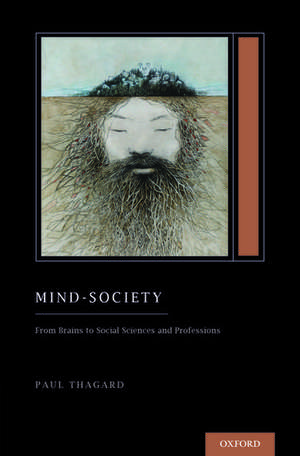Mind-Society: From Brains to Social Sciences and Professions: Oxford Series on Cognitive Models and Architectures
Autor Paul Thagarden Limba Engleză Hardback – 21 mar 2019
| Toate formatele și edițiile | Preț | Express |
|---|---|---|
| Paperback (1) | 202.15 lei 10-16 zile | |
| Oxford University Press – 13 oct 2021 | 202.15 lei 10-16 zile | |
| Hardback (1) | 335.28 lei 10-16 zile | |
| Oxford University Press – 21 mar 2019 | 335.28 lei 10-16 zile |
Preț: 335.28 lei
Preț vechi: 412.76 lei
-19% Nou
Puncte Express: 503
Preț estimativ în valută:
64.18€ • 69.73$ • 53.94£
64.18€ • 69.73$ • 53.94£
Carte disponibilă
Livrare economică 20-26 martie
Preluare comenzi: 021 569.72.76
Specificații
ISBN-13: 9780190678722
ISBN-10: 0190678720
Pagini: 488
Dimensiuni: 239 x 165 x 38 mm
Greutate: 0.86 kg
Editura: Oxford University Press
Colecția OUP USA
Seria Oxford Series on Cognitive Models and Architectures
Locul publicării:New York, United States
ISBN-10: 0190678720
Pagini: 488
Dimensiuni: 239 x 165 x 38 mm
Greutate: 0.86 kg
Editura: Oxford University Press
Colecția OUP USA
Seria Oxford Series on Cognitive Models and Architectures
Locul publicării:New York, United States
Recenzii
Provides a unified, mechanistic theory for the "Disciplines" and "Professions" that make up the social sciences... Interdisciplinary scholars in philosophy or the social sciences will find this book challenging but ultimately worthwhile
"In this book, Thagard offers a tour de force that traverses the expanse from the level of molecules and neurons, through mental processing, to societal forces of stability and change. He then applies this multi-level framework to explain earthly domains such as economics, religion and warfare, and to examine a variety of professions such as medicine, education and law. Mind-Society is at once accessible, insightful, and instructive. This compelling text makes cognitive science feel exceptionally clear, spanning and relevant." - Dan Simon, Professor of Law & Psychology, University of Southern California
"Mind-Society by Paul Thagard is an intriguing bookbroadly scoped, erudite, and framed by a unique perspective. It addresses both cognitive-emotional processes and social phenomena, moves fluidly between them, and weaves them together. It is the kind of book that I wish I could have written." - Ron Sun, Professor of Cognitive Sciences, Rensselaer Polytechnic Institute
"In this book, Thagard offers a tour de force that traverses the expanse from the level of molecules and neurons, through mental processing, to societal forces of stability and change. He then applies this multi-level framework to explain earthly domains such as economics, religion and warfare, and to examine a variety of professions such as medicine, education and law. Mind-Society is at once accessible, insightful, and instructive. This compelling text makes cognitive science feel exceptionally clear, spanning and relevant." - Dan Simon, Professor of Law & Psychology, University of Southern California
"Mind-Society by Paul Thagard is an intriguing bookbroadly scoped, erudite, and framed by a unique perspective. It addresses both cognitive-emotional processes and social phenomena, moves fluidly between them, and weaves them together. It is the kind of book that I wish I could have written." - Ron Sun, Professor of Cognitive Sciences, Rensselaer Polytechnic Institute
Notă biografică
Paul Thagard is a distinguished philosopher and cognitive scientist who has written many books, including The Brain and the Meaning of Life (Princeton University Press, 2010) and The Cognitive Science of Science (MIT Press, 2012). He is a Fellow of the Royal Society of Canada, the Cognitive Science Society, and the Association for Psychological Science.














